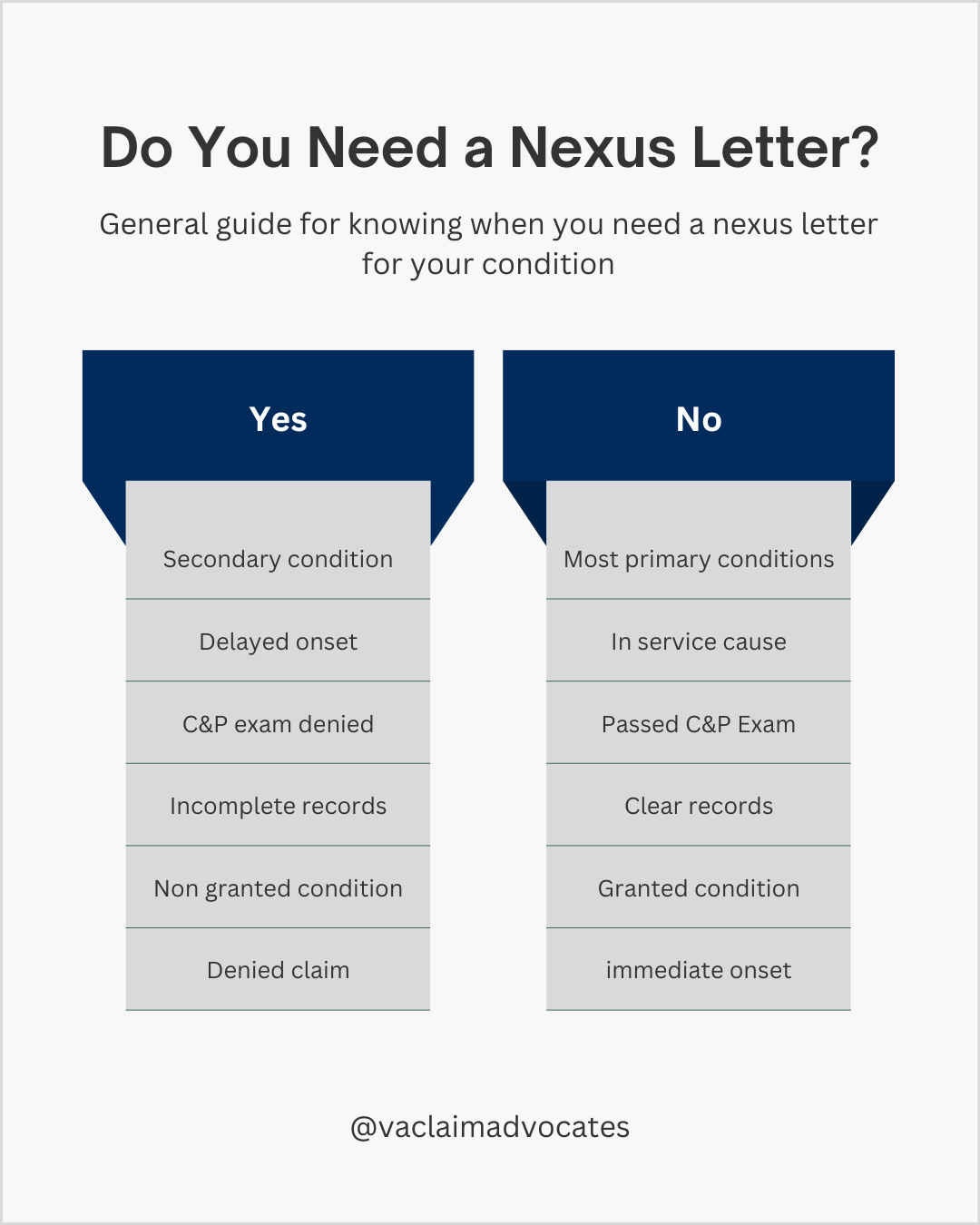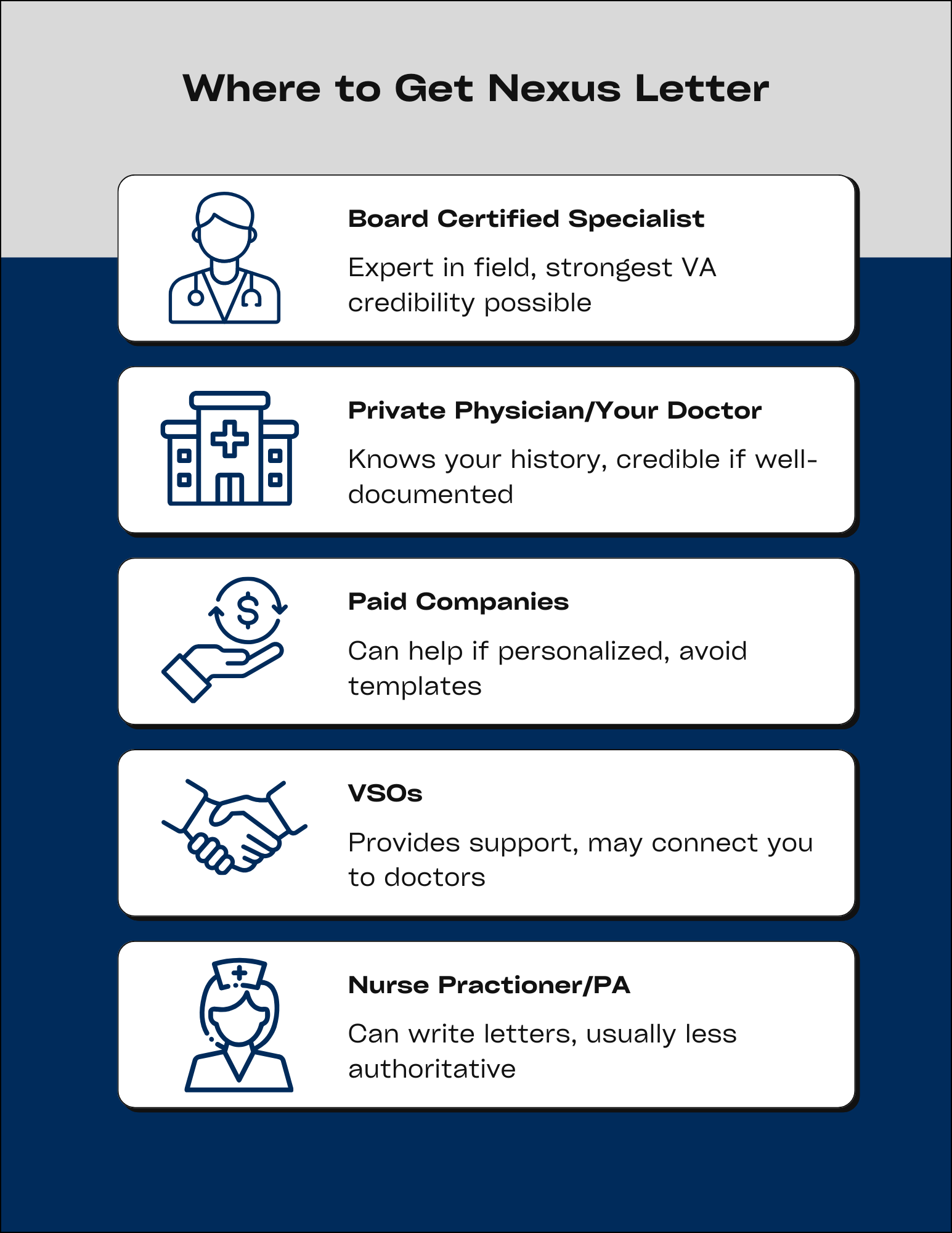What a Nexus Letter Is & Why It Matters for VA Disability Claims
Many veterans run into the same frustrating problem when it comes to VA nexus letters.
With C&P exams, VA doctors, and existing medical records, proving service connection feels like it should be straightforward without one.
In reality, it often isn’t. When veterans try to obtain a nexus letter, many doctors refuse, while private companies charge extreme prices with inconsistent results.
The truth is that some VA claims can be approved without a nexus letter, while others are extremely difficult to win without one.
This guide explains when a nexus letter is actually necessary, how to get one without paying a fortune, and what it must say for the VA to give it real probative weight.
What is a Nexus Letter?
A nexus letter is a written medical opinion from a licensed healthcare provider that connects your current disability to your military service, or to another service-connected condition.
How the VA Defines Nexus Letters
A “nexus letter” is not a special or standalone VA document. The term the VA actually uses is medical opinion, which is any written opinion that comes from a doctor.
This includes:
Medical opinion in treatment records: An opinion recorded during treatment where a doctor documented a condition as being related to military service.
C&P examiner medical opinion: An opinion from a VA examiner who is required to state whether a condition is related to service during a C and P exam
Private doctor medical opinion: An opinion from a doctor outside the VA system. The VA weighs it like any other medical evidence based on its reasoning and support.
The VA considers all of these medical opinions together when deciding service connection.
Where Nexus Letters Fits Into VA Claims
To win a VA disability claim, you must have three things:
Current Diagnosis – A verified medical condition.
In-Service Event or Injury – An event or injury that happened during service.
Medical Nexus – Medical evidence showing that the condition is connected to what happened in service
That third element, the nexus, is what this letter provides. Without it, the VA may not grant service connection if your military and service records are lacking.
In VA claims, nexus letters are used to establish service connection when it isn’t clear from service records.
When You Need a Nexus Letter for Your Condition
You usually only need a nexus letter when the medical connection to service isn’t already obvious. Secondary conditions almost always require one; straightforward primary conditions often do not.
You Lack Enough Evidence to Prove Service Connection
Sometimes the VA denies service connection based on your medical and service records alone.
This often happens when:
Denied or negative C&P exam: The examiner concludes there is no link between your condition and service, even if your symptoms are real.
Secondary condition claims: You are claiming a condition caused or aggravated by another service-connected disability, which requires a nexus letter connecting the secondary condition
Delayed onset conditions: Your condition developed years after service, making the connection less obvious in your records.
These are all valid claims. However, in situations like these, the VA often requires a nexus letter to establish the medical link needed for approval.
When You Can Win Your Claim Without a Nexus Letter
You often don’t need a nexus letter if you’ve already established service connection through your records or prior evidence. This is usually the case when:
Diagnosed during service: Your condition was documented while you were on active duty, making the connection to service clear.
Strong buddy and lay statements: Credible statements describe continuous symptoms from service to the present. In many claims, service connection is based largely on continuity of symptoms, and lay evidence can be especially strong for this.
Positive C&P exam: The examiner agrees that your condition is at least as likely as not related to service, removing the need for additional medical opinion.
It’s also important to note that being denied does not automatically mean you need a nexus letter. For example, if a denial is based on a disagreement over rating criteria, that’s not an issue of service connection at all.
Who Can Write Your Nexus Letter?
Any licensed medical provider can write a nexus letter, but the VA gives more weight to doctors who provide detailed, well-reasoned medical explanations.
The key is understanding what your specific claim requires and choosing the doctor whose expertise fits those needs
Best Types of Providers for a Strong Nexus Letter
You’ve probably heard people say a nexus letter only “counts” if it comes from a certain type of doctor, but no single provider is the best choice for every claim.
Primary Care Provider: A good starting point since they already know your medical history. They offer decent credibility and are often easier to reach locally, especially if you’ve had a long, consistent relationship with them.
Nurse Practitioner – While their opinions carry less weight with the VA, they’re typically more accessible and can still help by verifying ongoing symptoms or treatment. These nexus letter work best as supporting evidence.
Specialist – Brings high medical credibility and is often necessary for complex or secondary conditions. Specialists can clearly explain how one condition caused or worsened another, though they may be more expensive.
VA Doctors – Contrary to popular belief, VA doctors can write nexus letters and are often one of your best options. If you approach them the right way, they often complete them for free
Paid Companies – These are easy to access but vary greatly in credibility and quality. They usually have a good understanding of VA language, but are prone to using generic templates. You should only hire a company as a last resort.
In the end, the easiest way to get a nexus letter depends on your specific condition and the doctors available to you.
Nexus Letter Requirements
A strong nexus letter must clearly explain the diagnosis, evidence reviewed, and medical reasoning behind the service connection. The VA prioritizes clarity, detail, and credible documentation.
Here is a good checklist to follow:
Doctor Credentials – Include the doctor’s name, specialty, board certifications, and ideally a CV to show credibility.
Evidence Reviewed – The doctor should address all records including denials, failed C&P exams, and any other evidence mentioned.
Diagnosis – Clearly state a medical condition the patient has and how they reached that conclusion, including tests, exams, and medical literature if relevant.
Medical Reasoning – The most important part. The doctor should clearly explain why the condition is related to military service, reference medical literature, and rule out other likely causes.
VA Language – Use VA-specific language, like: “It is at least as likely as not (50% or greater probability) that the veteran’s condition is related to military service.”
Signature & Contact – The letter must be signed with full credentials and include contact information for follow-up if the VA needs clarification.
Having a nexus letter by itself is only useful if it meets these criteria. The VA discounts letters that are vague or incomplete.
What Your Nexus Letter Should Actually Say
Your doctor should open the nexus letter by stating who they are and how they know you. After that, they should give their medical opinion and clearly explain the reasoning behind it.
How A Basic Letter Reads
I am [Doctor Name, Credentials] .
I evaluated [Veteran Name] and reviewed their
service treatment records, medical history, prior evaluations, and reported symptoms .
Based on this review and my clinical examination, I confirmed a diagnosis of
[Diagnosis] .
After establishing the diagnosis and timeline, I assessed possible causes.
It is my medical opinion that the condition is at least as likely as not (50% or greater probability) related to
[specific in-service event, exposure, or condition]
that occurred during
[dates or period of military service] .
This conclusion is supported by
[medical reasoning such as symptom onset, medical research, known risk factors, or pathophysiology] ,
and there is no more medically probable non-service explanation for
[Veteran Name]’s condition.
If your claim has a well-documented timeline, supportive treatment records, and no conflicting medical opinions, a streamlined nexus letter like this typically works very well.
When a Nexus Letter Needs More Detail
Sometimes, you’ll need your nexus letter to address extra factors to fully establish service connection. In these situations, a basic opinion isn’t enough:
You had a negative C&P exam: Your doctor should explain why the examiner’s reasoning is incorrect, incomplete, or not supported by the evidence in your file.
You have other possible causes for your condition: Your doctor should address the most common alternative explanations and show why they don’t fully explain your symptoms.
You’re filing a secondary condition: Secondary claims require a clear cause-and-effect explanation. Your nexus letter should briefly explain how your primary condition caused or aggravated the secondary one.
Your symptoms appeared years after service: If your symptoms were delayed, your doctor needs to explain the medical basis for delayed onset and why it still connects to your service.
You’re dealing with a weaker medical link: Some conditions, like sleep apnea secondary to tinnitus, require stronger reasoning. These letters often need medical literature and more detailed medical analysis to hold weight.
Need Help With Your VA Claim?
Speak with a VA claims specialist to understand your options and next steps.
Call 888-820-8520How Much Do Nexus Letters Cost?
Nexus letters can range from free to over $3,000 depending on provider expertise and case complexity. A higher cost doesn’t guarantee a stronger medical opinion.
Situations Where You Can Get a Cheap or Free One
Sometimes you can get a strong nexus letter for cheap or even free — especially if your VA disability is straightforward and you handle most of the prep yourself.
You have a good relationship with your PCP: Doctors who know your medical history are more likely to write a letter or include the nexus opinion directly in your records.
You do research and front-end work: Organizing your evidence, timeline, and summary makes the doctor’s job easier and reduces the time they need to spend reviewing your case.
You have a relatively simple case: If the link between your service and condition is obvious, a basic letter from your provider may be enough. For example, nexus letters for tinnitus are usually simple because veterans are known to have have hearing problems after service.
Be prepared to spend a little bit regardless since most doctors want to be paid for their time.
When Nexus Letters are Expensive and Why
Some nexus letters cost more because the case requires extra time, expertise, or effort to verify.
You change doctors frequently: Without a consistent provider who knows your history, new doctors must spend more time reviewing records before forming an opinion.
You have a secondary condition: These claims require detailed medical reasoning to explain how one condition caused or aggravated another, which often means hiring a specialist.
Limited local resources: If there aren’t many qualified providers nearby, you may need to pay for a specialist review or use an independent medical examiner (IME) online.
If your case is especially complex, it may be worth investing in a specialist who can provide a detailed, well-supported medical opinion that meets VA standards.
What Happens After You Submit Your Nexus Letter & Next Steps
The VA reviews your nexus letter alongside your C&P exam and medical records. The strength of the medical reasoning determines how much weight the letter carries in your claim.
A VA Rater Reviews it
Once your nexus letter is submitted, a VA rater reviews it closely. From my experience, here’s what they care about most:
The doctor is actually qualified: Not every provider can give a strong opinion on every condition. For example, a nurse practitioner usually can’t give the same weight on sleep apnea as a pulmonologist.
The doctor reviewed real evidence: Raters can spot a five-minute template letter. They want to see that your doctor actually looked at your service records, medical history, and the full context of your claim.
The doctor addresses conflicting evidence: If you’ve had a negative C&P exam or previous denials, your nexus letter must explain why those opinions are incomplete or incorrect. VA examiner opinions carry a lot of weight, so your doctor needs to take them seriously.
Your Claim is Approved, Deferred, or Denied
Below are the three outcomes that could occur. Your claim could be:
Deferred: If your VA claim is deferred, VA needs more information before deciding, usually because there’s conflicting or incomplete evidence that must be clarified.
Approved: The VA accepted your nexus letter and found the medical reasoning strong enough to grant service connection.
Denied: The VA may deny a claim with a nexus letter if it was deemed insufficient or the rater did not properly weigh the opinion against other evidence.
Submit the Right Type of Appeal
Before appealing, do a thorough audit of your entire submission to make sure your evidence, nexus letter, and medical reasoning are as strong as possible.
Here are your three VA appeal options:
Supplemental Claim: Use this when your claim has evidence gaps. If the VA acknowledges your evidence but still explains clear issues, you’ll need stronger or new documentation to move forward.
Higher-Level Review (HLR): Choose this when you already have a strong claim and need a more thorough review. If the VA didn’t address your nexus letter or overlooked key evidence, an HLR gives a senior rater the chance to correct it.
Board of Veterans’ Appeals: Go this route when your case is solid but keeps getting denied due to complexity. For example, many veterans don’t obtain a va disability rating for sleep apnea until you reach the board level due to the condition’s complexity.
Nexus Letter Myths vs Facts
Many veterans misunderstand how the VA uses nexus letters. The truth is that the VA weighs all medical opinions by their accuracy and reasoning—not by whether they come from private or VA doctors
Myth: The VA always discounts private nexus letters.
The VA weighs all medical evidence based on its probative value (how detailed, reasoned, and credible it is). A well-supported private opinion can carry just as much weight as a VA doctor’s.
Myth: Paid nexus letters are better than free nexus letters
Paying for a letter doesn’t guarantee success. If the letter is templated or lacks individualized reasoning, it can actually be given less weight by the VA.
Myth: VA doctors are always superior to private doctors.
Neither has automatic priority, what matters is the quality of the medical opinion. In fact, private doctors sometimes provide stronger reasoning, especially if VA examiners overlook evidence.
Myth: If the VA doesn’t mention your nexus letter in the decision, it doesn’t matter.
The VA is required to consider all evidence. If your nexus letter isn’t addressed, that could be a procedural error and grounds for appeal. For example, examiners often overlook strong nexus letters for sleep apnea, but you can still overcome this with clear medical reasoning and properly submitted appeal
Myth: Symptoms alone are enough for a nexus letter.
Symptoms must be tied to a diagnosis and connected to service (or to a service-connected condition). Without that link, a nexus letter won’t hold weight.
Myth: Every VA claim requires a nexus letter.
Not always. If your condition was diagnosed and documented during service, a nexus letter may not be necessary at all.
Final Thoughts on Nexus Letters
In short, a VA nexus letter is a critical tool for proving the connection between your service and your medical condition.
Knowing what it is, who can write it, and what makes it effective can dramatically improve your chances of a successful claim.
By approaching nexus letters strategically and ensuring your letter is credible, well-documented, and tailored to your condition, you give yourself the strongest possible support for your VA disability claim.
FAQ
-
The cost of a nexus letter can vary — some are free, while others may range from around $500 to several thousand dollars. However, a higher price does not automatically mean a better letter. What matters most is finding a trusted doctor who provides a well-reasoned, individualized opinion. Be cautious with paid services that simply copy and paste; the VA gives little weight to generic letters.
-
A veteran cannot submit a nexus letter on their own, but they can draft a template, organize supporting evidence, and then have a doctor review and finalize it. This approach is often more affordable than paying for a fully written letter from scratch.
-
Technically, VA doctors can write nexus letters, but many choose not to. The reason is often a conflict of interest — their role is to provide treatment within the VA system, not to support or challenge disability claims.
-
A nexus letter is worth it when the VA does not see enough medical evidence to connect your condition to your time in service on its own. However, it is only worth pursuing if the letter is strong and well-supported. Paying a high price for a low-quality nexus letter will not improve your claim and is often just a waste of money.
-
Be direct and professional. Bring your medical records, explain why you believe your condition is service-related, and ask if your doctor feels comfortable providing a medical opinion.
-
A nexus letter is treated as medical evidence and becomes part of your VA claims file. It is not a VA form, but supporting documentation for your claim.?
-
You generally don’t need a nexus letter for a higher rating if you are already service connected for that condition. You only need one for a rating increase if you are filing for a new condition.






